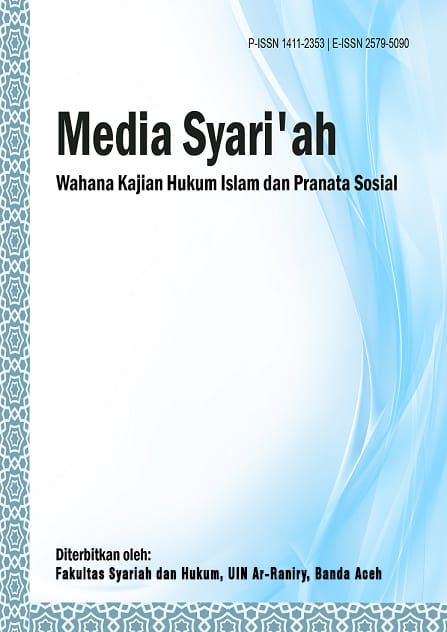Wali Nikah Fasik (Studi Perbandingan Mazhab Hanafi dan Mazhab Syafi’i)
DOI:
https://doi.org/10.22373/jms.v22i1.6533Keywords:
Wali nikah, Fasik, Mazhab Hanafi, Mazhab Syafi’iAbstract
Abstrak: Tulisan ini mengkaji perbandingan antara mazhab Hanafi dan Syafi’i yang membahas mengenai wali nikah yang fasik. Dari hasil penelitian dapat disimpulkan bahwa menurut mazhab Hanafi wali yang fasik boleh menjadi wali dalam pernikahan anak atau keponaan perempuannya. Sedangkan menurut mazhab Syafi’i tidak sah wali nikah orang yang fasik, akan tetapi beliau mensyaratkan wali itu harus adil. Perbandingan keabsahan wali nikah yang fasik keduanya berbeda dalam memahami hadis dari segi maknanya, hadis yang digu nakan berbeda mazhab Hanafi menggunakan dasar hadis yang lemah, sedangkan mazhab Syafi’i menggunakan dalil yang kekuatan sanad, matan serta rawi yang kuat.
Abstrak: This paper examines the comparison between the Hanafi and Shafi'i schools which discuss wicked marriage guardians. From the results of the study it can be concluded that according to the Hanafi school of wicked guardians may be guardians in child marriages or female nieces. Whereas according to the Shafi'i school the illegitimate marriage guardian of the wicked, but he requires that guardian must be fair. Comparison of the validity of wicked marriage guardians both differ in understanding the hadith in terms of meaning, the traditions used are different Hanafi schools using a weak basis of hadith, while the Shafi'i school uses a proposition that is the power of sanad, matan and strong rawi.
References
Abdul Aziz Dahlan. (1996). Ensiklopedi Hukum Islam. Ikhtiar Baru.
Abi Hasan bin Muhammad bin Habib al-Mawardi. (n.d.). Hawi al-Kabir. Dar al-Kutub al-Ilmiyah.
Abu Hafsh Umar bin Ali bin Adill al-Damasyqi. (n.d.). al-Lubab fi Ulum al-Kitab. Dar al-Kutub Alamiyah.
Abu Qaim Sulaiman bin Ahmad at-Thabrani. (1995). al-Mu’jam al-Ausath. Dar al-Haramain.
Ahmad Bin Umar. (2003). Fiqh Nikah Panduan untuk Pengantin, Wali & Saksi, alih Bahasa Heri Purnomo, Saiful Mahdi. Mustaqiim.
Al-Bassam, A. bin A. (2006). Syarah Bulughul Maram. Pustaka al-Kautsar.
Al-Jaziri, A. (2001). al-Fiqh ala Mazahibil Arba’ah. Dar al-Fikr.
As Shan’ani. (1995). subulussalam. Al-Ikhlas.
Az-Zuhaili, W. (2011). Fiqih Islam Wa Adillatuhu. Gema Insani.
Imam Alaudin Abu Bakar Ibnu Mas’ud al-Kasani. (n.d.). Kitab Bada’i as-Shonai. Dar al-Kutub al-Ilmiyah.
Muhammad Galib. (2012). Fasik:Makna dan Cakupannya. Alauddin Press.
Muhammad Ghazali. (2003). Fiqh Munakahat. Kencana.
Mustafa al-Khim, Mustafa al-Mulgha, A. asy-S. (n.d.). Kitab Imam Syafi’i. Pustaka Salam.
Sahal Mahfudh. (2006). Solusi Hukum Islam, Keputusan Muktamar, Munas Nahlatul Ulama. Diantama.
Yusuf, S. A. (n.d.). Syaikh Hasan Ayyub.
Yusuf, S. A. (2001). Fikih Keluarga. Pustaka al-Kautsar.
Downloads
Published
Issue
Section
License
MEDIA SYARI'AH: Wahana Kajian Hukum Islam dan Pranata Sosial has CC-BY-SA or an equivalent license as the optimal license for the publication, distribution, use, and reuse of scholarly work. Authors who publish with this journal agree to the following terms:
1. Authors retain copyright and grant the journal right of first publication with the work simultaneously licensed under a Creative Commons Attribution-ShareAlike 4.0 International License that allows others to share the work with an acknowledgment of the work's authorship and initial publication in this journal.
2. Authors are able to enter into separate, additional contractual arrangements for the non-exclusive distribution of the journal's published version of the work (e.g., post it to an institutional repository or publish it in a book), with an acknowledgment of its initial publication in this journal.
3. Authors are permitted and encouraged to post their work online (e.g., in institutional repositories or on their website) prior to and during the submission process, as it can lead to productive exchanges, as well as earlier and greater citation of published work (See The Effect of Open Access).
You are free to:
Share — copy and redistribute the material in any medium or format.
Adapt — remix, transform, and build upon the material for any purpose, even commercially.
The licensor cannot revoke these freedoms as long as you follow the license terms.
All papers published in MEDIA SYARI'AH: Wahana Kajian Hukum Islam dan Pranata Sosial are licensed under a Creative Commons Attribution-ShareAlike 4.0 International License.




.png)


.png)
.png)
.png)



